FIW-PB 59 Advancing the European Green Deal with Industrial Policy

Abstract:
The case for green industrial policy is strong and it is the obvious instrument to induce the structural transformation towards an emission-free economy. At the core of such a transformation lies the decarbonisation of the energy system. The industrial policy effort required to achieve the ambitious net zero objective in the European Green Deal (EGD) can be divided into three policy tasks: expanding renewable energy sources, raising energy efficiency across sectors and developing new technologies for industrial production processes where clean technologies are not available yet. While the first two tasks can rely on cost-competitive technologies and the required investment costs could in the long run pay for themselves, the third task constitutes formidable technological challenges that need to be tackled with a mission-oriented industrial policy. The industrial policy package employed ought to be a mix of public investments, green subsidies coupled with appropriate environmental regulations and an industrial mission for developing net zero industrial technologies. Importantly, with investment costs estimated at 1.75% of GDP per year, achieving the objectives of the EGD seems feasible also from a financial perspective. Despite this optimistic tone, the EGD is far from being a safe bet, and its success can easily be threatened by a plethora of factors, including opposition by vested interests or geopolitical confrontations.
Roman Stöllinger (WU Vienna)
Advancing the European Green Deal with Industrial Policy
FIW-Policy Brief 59
June 2023
Language: English
Zusammenfassung:
Die Argumente für eine grüne Industriepolitik sind überzeugend, und sie ist das offensichtliche Instrument, um den Strukturwandel hin zu einer emissionsfreien Wirtschaft einzuleiten. Im Zentrum eines solchen Wandels steht die Dekarbonisierung des Energiesystems. Die industriepolitischen Anstrengungen, die erforderlich sind, um das ehrgeizige Netto-Null-Ziel des Europäischen Grünen Deals (EGD) zu erreichen, lassen sich in drei politische Aufgaben unterteilen: Ausbau der erneuerbaren Energiequellen, Steigerung der Energieeffizienz in allen Sektoren und Entwicklung neuer Technologien für industrielle Produktionsprozesse, für die es noch keine sauberen Technologien gibt. Während die ersten beiden Aufgaben auf kostenkompatiblen Technologien beruhen und sich die erforderlichen Investitionskosten langfristig selbst tragen könnten, stellt die dritte Aufgabe eine große technologische Herausforderung dar, die mit einer missionsorientierten Industriepolitik angegangen werden muss. Das industriepolitische Maßnahmenpaket sollte eine Mischung aus öffentlichen Investitionen, umweltfreundlichen Subventionen in Verbindung mit angemessenen Umweltvorschriften und einer industriellen Mission zur Entwicklung von Netto-Null-Industrietechnologien sein. Wichtig ist, dass die Investitionskosten auf 1,75 % des BIP pro Jahr geschätzt werden, so dass die Ziele des EGD auch aus finanzieller Sicht realisierbar erscheinen. Trotz dieses optimistischen Tons ist der EGD alles andere als eine sichere Sache, und sein Erfolg kann leicht durch eine Vielzahl von Faktoren gefährdet werden, einschließlich des Widerstands von Interessengruppen oder geopolitischer Konfrontationen.
Roman Stöllinger (WU Wien)
Advancing the European Green Deal with Industrial Policy
FIW-Policy Brief 59
Juni 2023
Publikationssprache: Englisch